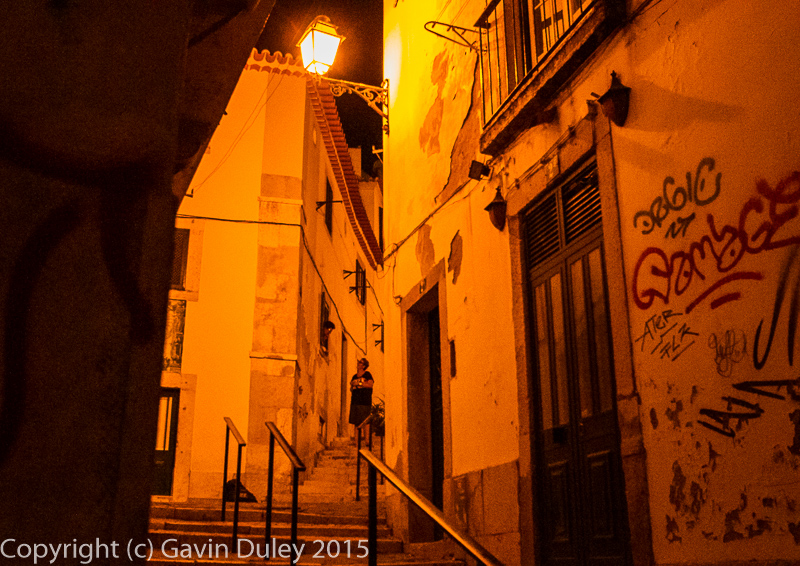 Alfama, 22nd October 2015 21:14
Alfama, 22nd October 2015 21:14
- The ‘m’ in Belém isn’t pronounced.
- Alfama, winding, fractal-like, sprawling, tumbling towards the sea but never quite reaching it, is the old part of town. Being on a hill, it wasn’t destroyed by the tsunami that followed the earthquake of 1755. Baixa, the lowlying city centre area, was; and was rebuilt on a grid. It is more formal, more ordered.
- The city, to Lisboans, is like a young woman. Is a young woman. Lisbon is always referred to as ‘she’, never ‘it’. Maria Lisboa. Alfama’s narrow streets are like her arms, holding you in an embrace.
- St Anthony of Padua (Santo António de Lisboa in Portuguese) is Lisbon’s patron saint. His feast day — in June — is an excuse for a festival, a city-wide party, with stalls hawking food and drink all over the city. He is also the saint of mariners, of the poor, of pregnant women and of infertility, of travellers and of the unemployed, of seekers of lost articles, of shipwrecks and starvation.
- The Torre de Belém (Belem Tower) stands out alone in the bay. From the Monument to the Discoveries, you can look past it towards the Atlantic. But it’s better close up. From the shore, you get a sense of its isolation from the land it is meant to protect. The river roils against its walls, fish pushed into crags in the sheer stone walls. If it is isolated from the land, it also seems alien in its riparian setting. Neither one nor the other.
- The melancholic whistle of the traditional knife-sharpeners is meant to bring rain. They cycle from door to door, their knife-sharper pedal operated.
- Fado is, perhaps, the music of Portugal. It is expressive of saudade – a peculiar kind of melancholy and nostalgia, a longing for lost love, or a lost homeland. It’s sad, but it’s happy too, as if looking back on a lost or almost forgotten joy. Fado is the music of immigrants, of wives left at home whilst their husbands were at sea. When much was banned or repressed under Salazar, fado was still allowed.
- Fado is played with classical guitar and Portuguese guitar. The Portuguese guitar — somewhat like a cross between a lute and a mandolin — is tear-shaped, because fado is sad, the music of loss and longing.
- Fado is the music of Alfama. At night, it spills out from the cafés into the winding backstreets, where nine hundred years of living have created a chaotic labyrinth of streets and houses. In its steeply sloped alleyways, people come and go, stare out of windows, stand in doorways and watch the world. Women hold conversations across the street, from one window to another. Even in October, the night is still warm, the air filled with a sense of the ocean.